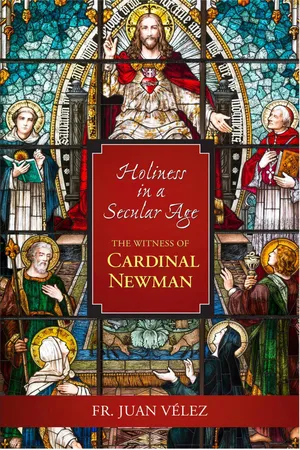
- English
- ePUB (mobile friendly)
- Available on iOS & Android
About this book
Saint John Henry Newman (1801–1890), a pre-eminent English intellectual and convert to Catholicism, was brought up in a low Church Anglican home where his grandmother and an aunt first nurtured his love for the Bible. At the age of 15, after a short period of entertaining religious doubts, he had a first conversion to Evangelical Christianity. For a few years he was influenced in his piety and biblical reading by evangelical authors, and later in the sacramental and ecclesial life by Anglican theologians. Then in 1845, through the study of the Church Fathers, he came to a profound understanding of authentic development of doctrine, in particular the exercise of the Pope's office; it was then that he became Roman Catholic. He lived during a period similar to ours: one of economic and technological progress that was accompanied by an embrace of materialism and a subsequent loss of faith and moral breakdown. Newman's writings challenge us, contemporary men and women, living in a world beset by these similar ills. His writings on the subject of holiness, the practice of the Christian virtues, the objective nature of truth and its relationship to the moral conscience, university education, and the role of the laity in society and the Church are very much needed today. Individuals, parish groups, and students at Newman Centers will benefit and learn from St. John Henry Newman's life example, insights, and teachings found in this book." Cardinal John Henry Newman (1801–1890), a pre-eminent English intellectual and convert to Catholicism, was brought up in a low Church Anglican home where his grandmother and an aunt first nurtured his love for the Bible. At the age of 15, after a short period of entertaining religious doubts, he had a first conversion to Evangelical Christianity. For a few years he was influenced in his piety and biblical reading by evangelical authors, and later in the sacramental and ecclesial life by Anglican theologians. Then in 1845, through the study of the Church Fathers, he came to a profound understanding of authentic development of doctrine, in particular the exercise of the Pope's office; it was then that he became Roman Catholic. He lived during a period similar to ours: one of economic and technological progress that was accompanied by an embrace of materialism and a subsequent loss of faith and moral breakdown. Newman's writings challenge us, contemporary men and women, living in a world beset by these similar ills. His writings on the subject of holiness, the practice of the Christian virtues, the objective nature of truth and its relationship to the moral conscience, university education, and the role of the laity in society and the Church are very much needed today. Individuals, parish groups, and students at Newman Centers will benefit and learn from Blessed Newman's life example, insights, and teachings found in this book." Newman was canonized by Pope Francis in 2019 and declared a Doctor of the Church by Pope Leo XIV in July 2025.
Frequently asked questions
- Essential is ideal for learners and professionals who enjoy exploring a wide range of subjects. Access the Essential Library with 800,000+ trusted titles and best-sellers across business, personal growth, and the humanities. Includes unlimited reading time and Standard Read Aloud voice.
- Complete: Perfect for advanced learners and researchers needing full, unrestricted access. Unlock 1.4M+ books across hundreds of subjects, including academic and specialized titles. The Complete Plan also includes advanced features like Premium Read Aloud and Research Assistant.
Please note we cannot support devices running on iOS 13 and Android 7 or earlier. Learn more about using the app.
Information
Table of contents
- Dedication
- Acknowledgments
- Foreword
- Introduction
- Chronology of John Henry Newman
- Abbreviations
- I. Life of John Henry Newman: Biographical Sketch
- II. On Friendship
- III. Holiness and Christian Life
- IV. Meditation and Study of the Scriptures
- V. The Moral Life in the Kingdom of God
- VI. A Christian Vision of Pursuits in the World
- VII. Development of Doctrine: On Religious Truths
- VIII. Bishops and Popes: Authority in the Church
- IX. Celibacy and Marriage
- X. The Christian Gentleman
- XI. The Educated Layman and University Education
- XII. The Making of Men and the Reality of a University Education
- XIII. Educating Boys and The Oratory School
- XIV. Faith, Reason, and Science
- XV. Ecclesiology and Converts
- XVI. Newman’s Devotion to the Mother of God
- Holiness in a Secular Age: The Witness of Cardinal Newman
- Bibliography
- Index
- Photos
- Photo Credits